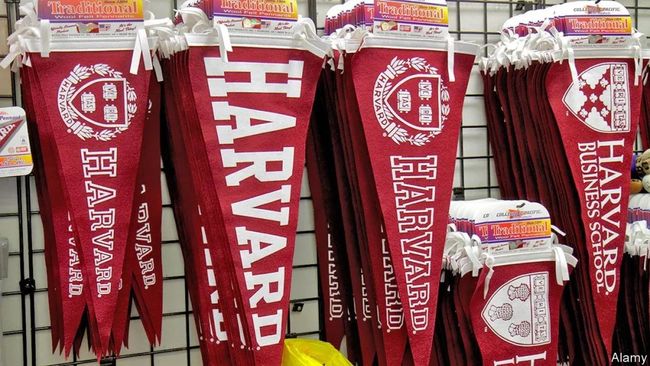Exorbitant privilege
Why legacy places should be abolished
Giving the children of alumni a leg-up makes no sense
“I AM SIMPLY thrilled about all the folks you were able to admit,” David Ellwood, the then dean of Harvard’s John F. Kennedy School of Government, wrote to the then admissions dean, William Fitzsimmons, in a 2013 email entitled “My hero”. “All big wins. [Name redacted] has already committed to a building.”
Charges brought against rich and famous people who are accused of illegally buying university places for their children has focused attention on an oddity in American higher education: that while it was illegal for these people to buy places, others can do so quite legally. This issue is normally hidden behind the veil of the “holistic” admissions policy which selective universities run. But a case in the Supreme Court in which Asian-American plaintiffs allege that Harvard’s admissions system is racially biased has thrown a light on preference given to different groups, including “legacies”—the children of alumni. Their parents do not have to fork out for them to be favoured, but since alumni are universities’ principal source of donations after foundations, institutions that practice legacy preference defend it as essential.
A survey by the Harvard Crimson, the student newspaper, found that 29% of the class of 2021 had a close relation who had been at the university; 18% had at least one parent there. Nor is the practice confined to the top institutions. A survey of 499 admissions directors by Inside Higher Ed found that 42% of those at private universities used legacy preference.
Legacy preference is, as Richard Kahlenberg, a senior fellow at the Century Foundation and editor of “Affirmative Action for the Rich”, points out, both entirely un-American and uniquely American. It flies in the face of the ideals on which America was founded—the rejection, as Thomas Jefferson put it, of the “artificial aristocracy” based on birth, which had corrupted Britain, in favour of a “natural aristocracy” based on “virtue and talents”. No other serious university system permits it. Universities in Britain, the only other country represented in the Times Higher Education league of the world’s top ten universities, use test scores supplemented, in some institutions, with an interview.
In the 1920s, Ivy League college administrators feared that relying too much on exams to screen applicants would yield a high number of Jewish students. They set up admissions systems which embedded legacy preference. In the egalitarianism of the post-war era, universities tried to get rid of legacies, but were defeated by passionate opposition from their alumni.
No combination of money and alumni clout, however powerful, will get a thick kid a place at a good university. University administrators point out that legacy applicants’ SAT scores tend to be higher than average—not surprising, since they tend to be richer and therefore better-prepared. In an interview with the Crimson, Mr Fitzsimmons referred to legacy as a “tip” which, other things being substantially equal, could win an applicant a place. But recent data suggest it is more than that. Michael Hurwitz, then at Harvard, calculated that, controlling for all relevant characteristics, being related to an alumnus of one of America’s top 30 universities increased an applicant’s chance threefold. Thomas Espenshade at Princeton found that it was the equivalent of 160 points on a SAT score where the maximum is 1,600.
The trial has forced Harvard to publicise its own numbers (see chart). The biggest advantage goes to athletes, but they are sometimes the same people as legacies—as some of the sports which ease students in (lacrosse, rowing, golf) suggest. “The best donors”, says an insider, “are sports scholars who went on to Harvard Business School. They ‘bleed crimson’.”
Universities that favour legacy applicants say doing so helps pay for need-blind admissions, under which universities pay the bills of poorer students. But as Richard Reeves of the Brookings Institution points out, “they admit so few poor people that this is pocket change for them.” According to Harvard’s Raj Chetty, the university has 14 times as many students from the top than the bottom economic quintile. Legacies take places that might go to poorer people: Mimi Doe of Top Tier Admissions points out that half of places at top universities are fenced off by racial, athletic and legacy preferences. “For students who don’t have any interesting ‘hooks’ on their cvs, acceptance rates of 10% of applicants come down to more like 5%.”
MIT, which does not favour legacies, has need-blind admissions. A study of 100 universities found that “the presence of legacy preference policies does not result in significantly higher alumni giving”; those with legacy preference got more money from alumni, but that was because they had richer alumni. Abandoning the practice might be in the universities’ interest. A study into the “child-cycle of alumni giving” found that donations increased when alumni’s children reached their early teens, and then dropped to below their original level when the child was turned down. Hell hath no fury like an alumnus whose child has been scorned.
Some institutions, including the University of California, Berkeley, the University of California, Los Angeles and Texas A&M, have abandoned the practice. More than two-thirds of Americans are against it. Mr Kahlenberg notes that universities are increasingly unpopular among Americans. “Some of this has to do with the idea that these are liberal bastions where students are being indoctrinated. But it is also about the fact that these are seen as gated communities where the privileged protect their positions in society.” A majority of the admissions directors surveyed by Inside Higher Ed opposed it, including 11% of those who practised it. The Crimson wants it ended. “It would make it a happier place,” says a Harvard insider. “So many of the students have impostor syndrome.”
Ron Wyden, a Democratic senator, plans to help legacy preference on its way by introducing a bill to limit tax breaks on donations before or while a child is enrolled. It is a condition of tax exemption that a donor should get no direct benefit from a donation; and although universities are very careful to make it clear that there is no quid pro quo, their defence of legacy preference—that it raises money—implicitly admits the connection.
But the likeliest impetus for change is the affirmative-action trial. “At present the universities can say they take into account lots of factors, including legacies,” says Mr Kahlenberg. “If you no longer have the minorities then it becomes harder to justify.” That, indeed, is what happened at the University of California and at Texas A&M: when racial preferences were ended, legacy preferences looked even more egregiously unfair, and were binned.
This article appeared in the United States section of the print edition under the headline "Exorbitant privilege"(Mar 21st 2019)
完整word资源详见「才思汇」社群
LearnAndRecord
2015年2月8日
2019年3月29日
第1511天
每天持续行动学外语

